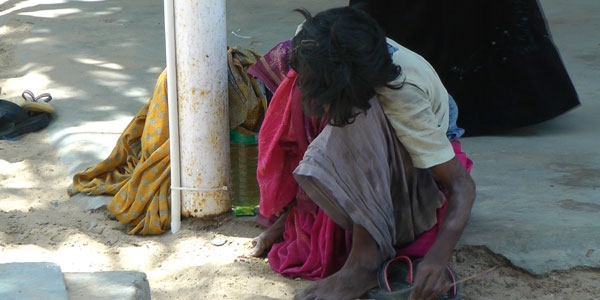
Neha Pattyridge (name changed), a Delhi-based entrepreneur was admitted to a mental hospital twice—in 2007 and 2012. She says mental asylums are exactly the way portrayed in films. “Women would urinate right there and nurses would laugh at them. The focus is on over-medication. It is easiest for authorities to deal with people who are sedated. Many mental hospitals don’t even have rehab programmes.” Ms Pattyridge’s experiences are echoed by several organizations and activists who have been working on exposing how women are treated in mental hospitals. Some of the observations have been as follows.
Delay in treatment
Dr Prabha Chandra of National Institute of Mental Health and Neuro Sciences (NIMHANS) believes that hospitals are often the last option for women with mental illnesses. “In our country, people believe a lot in jadoo-tona. We had done a study on women getting mental illness after or during pregnancy. This is a very vulnerable period. In our study, we found that first, most people go to temples, mosques and so on, and then after spending a lot of money, come to us. Out of 100 women, 60 came to us after going to various places of worship. They came after a month when they should have actually come after a week.”
Compromise in health and hygiene
Gunjan Sharma, a journalist, went to a mental hospital in Kolkata to understand its working and facilities. She says, “The condition of the women was terrible there. Their dresses were dirty; they wore no undergarments and were sleeping on the ground. In another hospital, an employee told me that women were not given baths and lice were treated with insecticides. It was a shocking sight. Patients are denied basic rights. You are supposed to heal them, not treat them like prisoners. There were ladies who were naked. Some were given their food next to the toilets,” Ms Sharma told the team from Satyamev Jayate. She went on to do an investigative report across mental hospitals in India.
Shubhada Maitra from the Tata Institute of Social Sciences in Mumbai was approached in 2003 by the Government of Maharashtra to undertake a three-month study of the four mental institutions in Maharashtra. She said that the condition of women was pitiable with the same situation seen by Ms Sharma—no clothes, no undergarments and even no sanitary pads given to them.
Sexual abuse
Ratnaboli Ray, the founder of ANJALI, a mental health rights organization in Kolkata, says there have been many cases of the authorities taking undue sexual advantages of the women patients. “There was a case in a hospital where one staff member went to a women’s cell to give a bottle of eye drops. This guy called one lady outside the ward and took her to the toilet and he abused and penetrated her. She screamed but nobody could hear as all the women were locked inside and other staff members were busy elsewhere.There were other cases of the authorities taking undue sexual advantages of the patients and we have documented them,” she told our team.
Rejection by family
According to Ms Maitra, women with mental illnesses are so stigmatized that they are rejected by their families even if they get better. “There is a fear of getting a younger sibling married if the elder one is mentally ill. Families don’t want to take them back. The husband can remarry; a nanny can take care of the kids. So the woman’s role can be dispensed and replaced very easily.”
Ms Ray sums up the situation of women in mental institutions. “Even our mental institutions are steeped in patriarchy. There is an unequal distribution of power in how we look at a man with mental illness and how we look at a woman with mental illness. Women are abandoned more easily and even in the funding allocation, there is bias in the budget. So the condition of women is far worse than men in any given hospital.”
SOME RAY OF HOPE
Across the country, various hospitals and NGOs are working towards de-institutionalizing persons suffering from mental illness. According to Dr Prabha Chandra of National Institute of Mental Health and Neuro Sciences (NIMHANS), female patients are admitted with female relatives at their hospital. “We also look at rehabilitation from the start. If there is a housewife admitted, we look at how she can be taught to cook again,” she says.
Organizations like The Banyan in Chennai, and Maher and Bapu Trust in Pune, work with women, in healing and rehabilitating them. “At The Banyan we follow a structured process from drugs to therapy. There is vocational training and occupational therapy. It then becomes a place to heal minds,” explains Vandana Gopikumar the founder of Banyan.